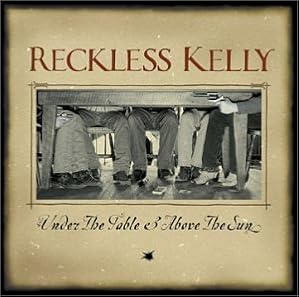Reckless Kelly is an Austin, Texas based Red Dirt band. The band was formed in Bend, Oregon, but moved to Austin in January 1997. Their name was inspired by Australian bank robber Ned Kelly.
Led by brothers Willy (vocals/guitar) and Cody Braun (vocals/fiddle/mandolin/harmonica), alternative country-rock outfit Reckless Kelly formed in Bend, Oregon, before relocating to Austin, Texas, in January 1997 (with a brief interlude in Bend, Oregon). The Brauns had previously toured with their father in Muzzie Braun & the Boys, a Western swing band, and were joined in their own group by lead guitarist Casey Pollock, bassist Chris Schelske, and drummer Jay Nazz.
Reckless Kelly's debut album, Millican, appeared in 1998; Acoustic: Live at Stubb's and The Day both followed two years later, after which David Abeyta replaced Pollock on lead guitar. Under the Table and Above the Sun from 2003 began the band's relationship with the high-profile Sugar Hill label and won the hearts of the music press and honky tonkin' legend Joe Ely, who sang the band's praises in interviews. Wicked Twisted Road was released in 2005, and the next year the live album Reckless Kelly Was Here captured the band's stage presence. Bulletproof was released in the summer of 2008 on a new label, Yep Roc Records, and includes tracks critical of and reflecting on recent sociopolitical unfoldings, such as the Iraq War and Hurricane Katrina. The band regularly returns to Austin to play before capacity crowds at venues like Nutty Brown Cafe & Amphitheatre.
Reckless Kelly Website
Led by brothers Willy (vocals/guitar) and Cody Braun (vocals/fiddle/mandolin/harmonica), alternative country-rock outfit Reckless Kelly formed in Bend, Oregon, before relocating to Austin, Texas, in January 1997 (with a brief interlude in Bend, Oregon). The Brauns had previously toured with their father in Muzzie Braun & the Boys, a Western swing band, and were joined in their own group by lead guitarist Casey Pollock, bassist Chris Schelske, and drummer Jay Nazz.
Reckless Kelly's debut album, Millican, appeared in 1998; Acoustic: Live at Stubb's and The Day both followed two years later, after which David Abeyta replaced Pollock on lead guitar. Under the Table and Above the Sun from 2003 began the band's relationship with the high-profile Sugar Hill label and won the hearts of the music press and honky tonkin' legend Joe Ely, who sang the band's praises in interviews. Wicked Twisted Road was released in 2005, and the next year the live album Reckless Kelly Was Here captured the band's stage presence. Bulletproof was released in the summer of 2008 on a new label, Yep Roc Records, and includes tracks critical of and reflecting on recent sociopolitical unfoldings, such as the Iraq War and Hurricane Katrina. The band regularly returns to Austin to play before capacity crowds at venues like Nutty Brown Cafe & Amphitheatre.
Reckless Kelly Website
Wicked Twisted Road:
My first love was a wicked twisted road
I hit the million mile mark at seventeen years old
I never saw the rainbow much less a pot of gold
yeah my first love was a wicked twisted road
my first love was a castle in the sky
I never thought I'd make it 'till I had the guts to try
and I sat up in my tower while the whole world passed me by
yeah my first love was a castle in the sky
my first love was a fearless drive in rain
scared to death I thought I'd never see her face again
they say god was crying so I guess he felt my pain
yeah my first love was a fearless drive in rain
my first love was a wild sinful night
I ran out with the big dogs guess I had more bark then bite
even thought I won the battle in the end I lost the fight
yeah my first love was a wild sinful night
my first love was an angry painful song
I wanted one so bad I went and did everything wrong
a lesson in reality would come before too long
yeah my first love was an angry painful song
My first love was a wicked twisted road
I hit the million mile mark at seventeen years old
I never saw the rainbow much less a pot of gold
yeah my first love was a wicked twisted road
my first love was a wicked twisted road

![Reblog this post [with Zemanta]](http://img.zemanta.com/reblog_e.png?x-id=23673710-abf8-406b-b771-c000a439f3db)

![Reblog this post [with Zemanta]](http://img.zemanta.com/reblog_e.png?x-id=5451c489-3911-4d31-a920-74a562741fb9)

![Reblog this post [with Zemanta]](http://img.zemanta.com/reblog_e.png?x-id=f0ba99e3-c142-4e63-ba84-34d494ebdf40)

![Reblog this post [with Zemanta]](http://img.zemanta.com/reblog_e.png?x-id=5ce040bd-f3b0-48c9-9538-08c32b5a6630)

![Reblog this post [with Zemanta]](http://img.zemanta.com/reblog_e.png?x-id=50636ddb-8ace-4cf6-8072-3d951f67e730)

![Reblog this post [with Zemanta]](http://img.zemanta.com/reblog_e.png?x-id=29e0746e-8fb4-45f2-b60a-f576e8deedb9)

![Reblog this post [with Zemanta]](http://img.zemanta.com/reblog_e.png?x-id=be445dcf-9c31-4a1c-8a16-ee97f1ac5bdf)

![Reblog this post [with Zemanta]](http://img.zemanta.com/reblog_e.png?x-id=405646eb-856e-418b-9e3b-368c6e944e39)

![Reblog this post [with Zemanta]](http://img.zemanta.com/reblog_e.png?x-id=fe0191e7-fdc7-4812-9051-1b7f39b911a6)

![Reblog this post [with Zemanta]](http://img.zemanta.com/reblog_e.png?x-id=18d2b94f-ed49-46a7-ab10-b7ca8f5cefbc)

![Reblog this post [with Zemanta]](http://img.zemanta.com/reblog_e.png?x-id=ce7ed237-5187-4192-9a69-4a10d7ad0b1a)

![Reblog this post [with Zemanta]](http://img.zemanta.com/reblog_e.png?x-id=67f9b3a3-0460-4fd9-a4a1-a511bcd37327)

![Reblog this post [with Zemanta]](http://img.zemanta.com/reblog_e.png?x-id=8e2dd20c-d006-488d-ab86-1182fc6e0970)

![Reblog this post [with Zemanta]](http://img.zemanta.com/reblog_e.png?x-id=3ca4a714-767d-48ec-9730-ede8db8b6e24)

![Reblog this post [with Zemanta]](http://img.zemanta.com/reblog_e.png?x-id=88be3f06-bf3e-4867-ae53-72c76a0b769a)

![Reblog this post [with Zemanta]](http://img.zemanta.com/reblog_e.png?x-id=e910b8c5-c638-4862-8592-3f8742b6459d)

![Reblog this post [with Zemanta]](http://img.zemanta.com/reblog_e.png?x-id=79cd8e06-19c1-4937-983c-136d7ba298ed)
